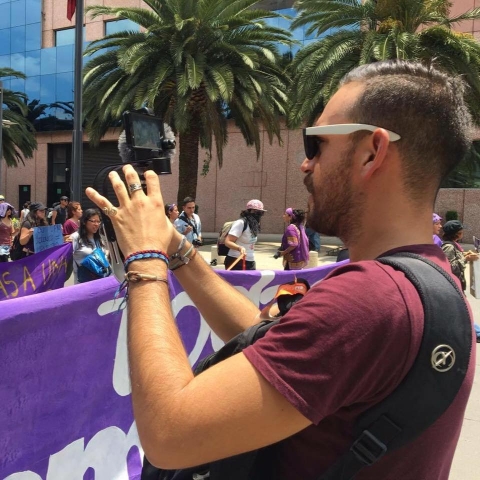
Journalist Carlos Mendoza of Honduras is one of the 220-plus professionals from 15 Latin American and Caribbean countries who have had the opportunity to improve their digital skills and develop digital media projects through the Emerging Media Leaders (EML) program, run by the International Center for Journalists (ICFJ) and sponsored by the U.S. Department of State.
Since 2015, media professionals from the region have worked directly with U.S. media organizations, developed entrepreneurial projects, and improved their skills in areas such as investigative journalism, fact-checking and podcasting. They also have worked to strengthen non-journalistic skills and knowledge, such as how to start and sustain a news business.
Mendoza participated in the first cohort of the program, and now, eight years later, talked with ICFJ about how his time as a fellow contributed to his career growth. During his fellowship, he spent four weeks embedded at AJ+ Español in San Francisco, and went on to work for the news outlet as a freelancer. Mendoza covered social unrest and women’s issues in Guatemala (including those facing Indigenous women), spotlighted a changemaker in one of Honduras’s most dangerous neighborhoods, shed light on migration and more. Today, he is the Americas communications content manager at Amnesty International.
What was your career trajectory after the program ended?
Right after I completed my embedment in June 2015, I remained in constant communication with my managers. The team realized that I had become an asset to the organization, and they offered me a retainer contract in July to continue supporting the Spanish-language outlet by producing stories focused on Latin America.
I worked for AJ+ until September 2016, when I joined Amnesty International. Sadly that year, Berta Caceres, a Honduran environmental, land and territory defender, was killed, and I pitched the story and was assigned to cover it. I contacted Amnesty International for an interview, as a delegation was present in the country to react to the killing, and I remained in contact with them. Months later, I traveled to Mexico, still working remotely for AJ+, and did a follow-up story interviewing people from Amnesty International. They sent me a job opening to share with my network. As I shared on social media and among colleagues, I realized that through my experience at AJ+, I fit the selection criteria and felt compelled to apply, landing the job later that year, when I was relocated to Mexico.
How did your experience as a fellow help prepare you for your current role?
It opened the door to learning more about the U.S. media landscape. We visited news outlets such as The Washington Post and USA Today, and participated in professional training with renowned journalists from top-tier media outlets. It was an outstanding opportunity as well to immerse myself in a leading media outlet like AJ+ Español. And I connected with top journalists from the region who were also fellows, which allowed me to learn from their own experiences in their countries and in the United States. This came in handy in pivoting my career to human rights communications, It equipped me with the necessary know-how.
How did you grow professionally as a fellow?
The program increased my skills as a video journalist. It helped me learn new techniques for making videos based on compelling personal stories and reliable fact-checking methods that strengthened my journalistic abilities. It also equipped me with an entrepreneurial mindset that has been key in today's digital world and for keeping up-to-date with ever-changing media consumption habits. I was better prepared to lead a team, as a result of the perspectives, experiences, knowledge, and journalistic and video production techniques I gained as a fellow.
How do you credit the EML program with helping you advance your career?
As a Honduran journalist, my possibilities of getting a job at an international news outlet were slim. The training and experiences I had as a fellow gave me more credibility as a professional, increasing my chances of taking my career to the next level.
Emerging Media Leaders is a program sponsored by the U.S. Department of State with funding provided by the U.S. Government and administered by ICFJ. This Professional Fellows Program (PFP) is an exchange program for media professionals (journalists, technologists, and media entrepreneurs) from Latin America and the Caribbean to harness the power of digital tools and create viable news businesses that provide news and information in the public interest. Learn more about the EML program here.